SEO is the strategy to implement for your hematology business if you want your hematology clinic to experience long-term growth and success. Investing in SEO for hematologists will help your hematology website be found by the right clients actively looking for your products or services, it will help you stand out from your local competitors and overall bring you more new potential clients.
Table of Contents
ToggleSEO for Hematologists
1. Understanding Search Engine Optimization
Optimizing your website and online content to rank higher on search engine results pages is referred to as SEO or search engine optimization. This strategy works by increasing organic traffic to your hematology website using on-page, off-page, and technical SEO, which helps you gain more new patients for your hematology clinic. Understanding SEO is important for any medical practice clinic that wants to thrive in the competitive online market.
To understand how search engines operate for SEO optimization, it’s important to understand the following steps:
Crawling is when search engine bots find new and updated content on your hematology site. The content could be a webpage, a PDF, images, videos, and other file types accessible to website crawlers that can be discovered through links.
Indexing is when a website or page URL is indexed, after the crawling stage. It stores, analyzes, and organizes the content and connections between pages. Indexing your URL is essential so search engines can find it, and so that it can rank on SERP.
Ranking happens when search engines use intricate algorithms to rank your web pages. Factors that contribute to your ranking depend on your content quality, relevance, and overall user experience.
2. Why SEO for Hematologists?
SEO for hematologists will help your hematology clinic gain visibility and credibility by ranking high on search engine results pages, as this indicates to search engines and users that you are an expert in the field. With SEO you can reach highly targeted audiences, and it involves less advertising costs in comparison to traditional advertising. You will gain long-term results of organic leads without the need for expensive ads, and a competitive advantage over your local competitors.
Let’s look at a Search Engine Results Page (SERP) for “Hematology near me Los Angeles California”:
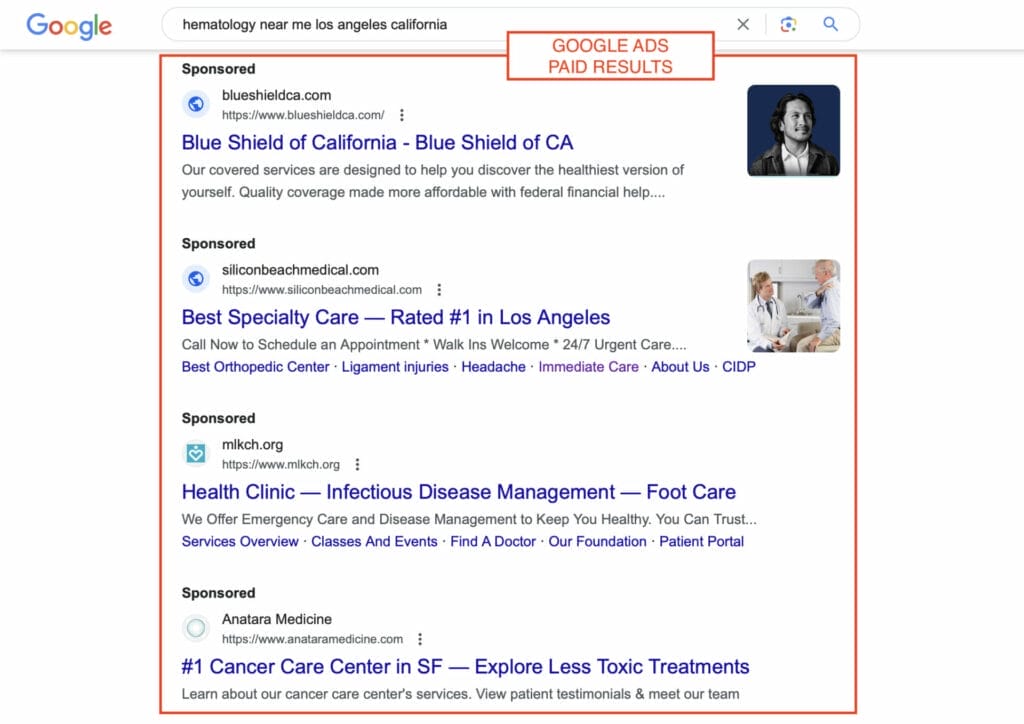
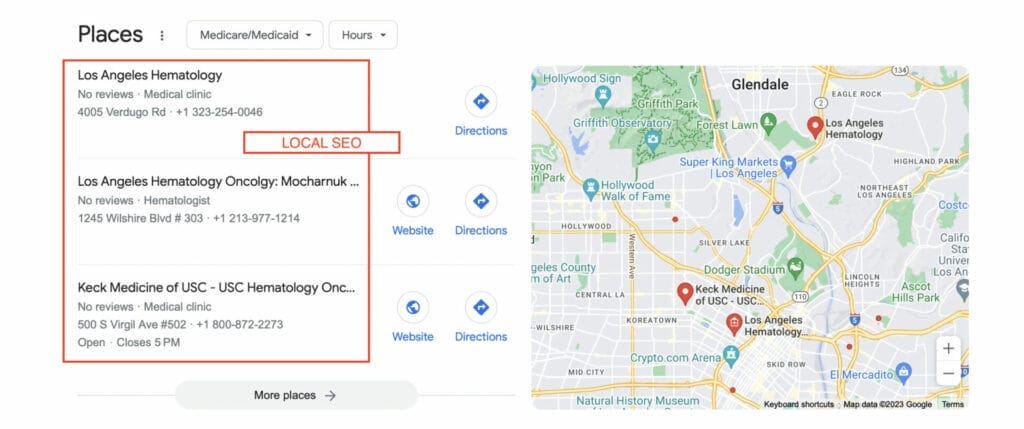
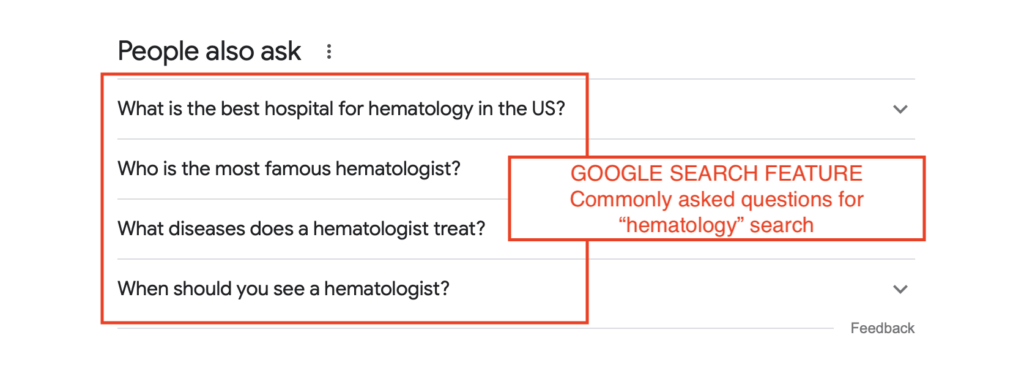

2.1 Local SEO
Apart from on-page, off-page, and technical SEO, you can also implement local SEO as part of your strategy for your hematology website if you have one or more physical locations for your hematology clinic. This will help you appear at the top of local search results for searches that specifically include your location, for example, “hematology blood test near me”. You can also encourage previous clients to leave feedback or online reviews, to help attract your targeted audience in your local area.
Need help optimizing your hematology website?
2.2. Keyword Research
Keywords are the backbone of SEO. To support your SEO efforts and ensure a successful SEO for hematologists campaign, you will need to implement target keywords in your hematology website. Make sure that you conduct comprehensive keyword research to have a better understanding of the search terms your target audience uses when looking for hematology services and treatments.
Choosing your keywords:
To help with your keyword research, consider the following factors:
- Monthly search volume indicates the number of times a specific keyword was searched within a month, or even within the last 12 months.
- Keyword difficulty is how difficult it is for a keyword to rank.
- Relevance to your business – Your keywords should be relevant to your hematology practice, and these can be services you offer or locations where your hematology practice operates.
- Search intent can be informational, navigational, transactional, or commercial. This refers to the intention a user has when searching for a keyword.
Types of search intent:
- Informational intent: These searches will usually be phrased questions with terms such as “how”, “why”, “tips” and “solution”.
- Navigational intent: This is usually an indication that the user already knows what they are searching for, such as “hematologist near me for anemia”
- Commercial intent: These will usually indicate that a user is researching something before deciding to make a purchase or book an appointment. These can also involve searches such as “hematology clinic near me x reviews”
- Transactional intent: This is when a user has the intent to make a specific purchase, book an appointment, or even sign up for a newsletter after having enough information about something.
3. On-Page SEO Strategies
On-page SEO (also known as on-site SEO) involves optimizing your web pages to rank higher on search engines. Some of these factors you can optimize for on-page SEO are title tags, relevant keywords, internal links, meta descriptions, and URL slugs.
Keyword research is also a part of on-page SEO strategies you can implement for your hematology website. Now that we understand the importance of keyword research, let’s look at the different tools you can use to help with your keyword research:
3.1 Keyword Tools for Keyword Research
Google Autocomplete Predictions is a feature that works by using an automated system to generate real and trending predictions from relevant queries based on the location and language of the search query.
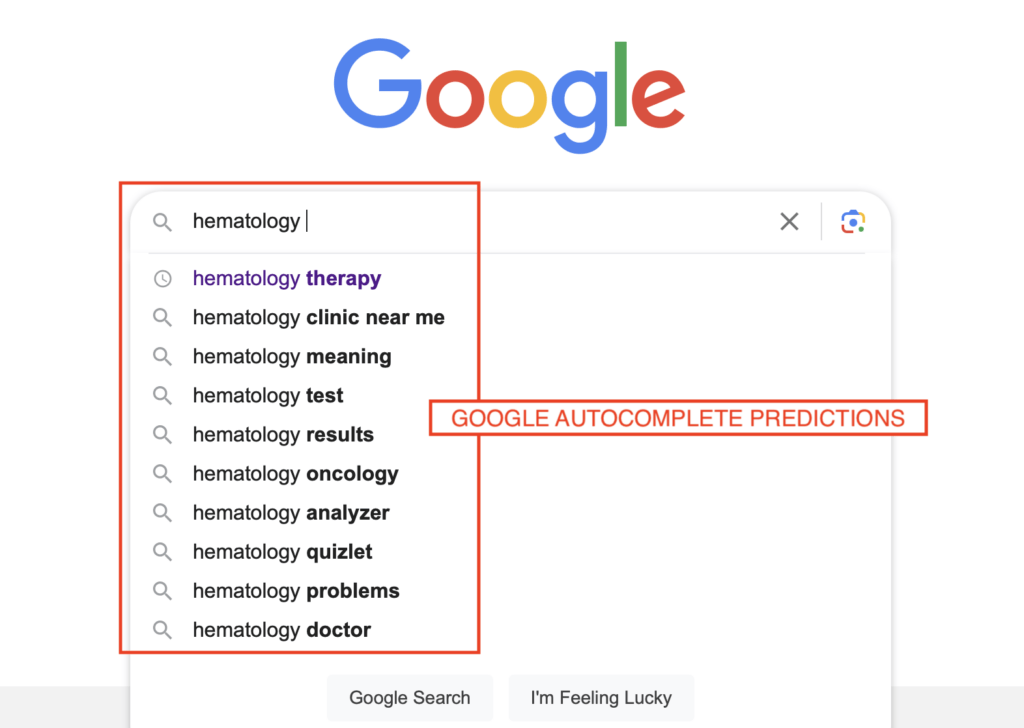
Google Related Searches will usually be found at the bottom of the results page. This feature is helpful for finding keywords that can better help understand the search intent of your target audience because it generates SEO-related search keywords based on Google’s algorithm.
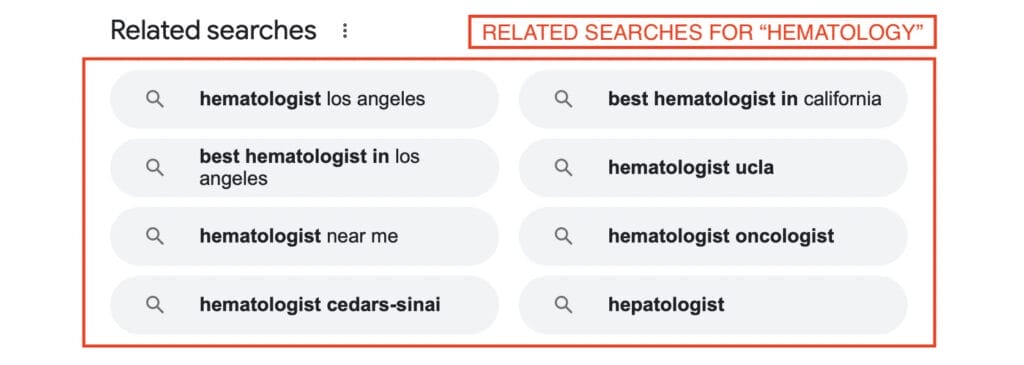
Google Keyword Planner is another tool from Google you can use as part of your keyword research. It can help you discover keywords relevant to your content and your target keywords, and it can provide data insights on a keyword’s average monthly searches, its competition level, and its top-of-page bids. Keyword planner is a useful tool for finding the right high-intent keywords that will help your target audience find your hematology website.
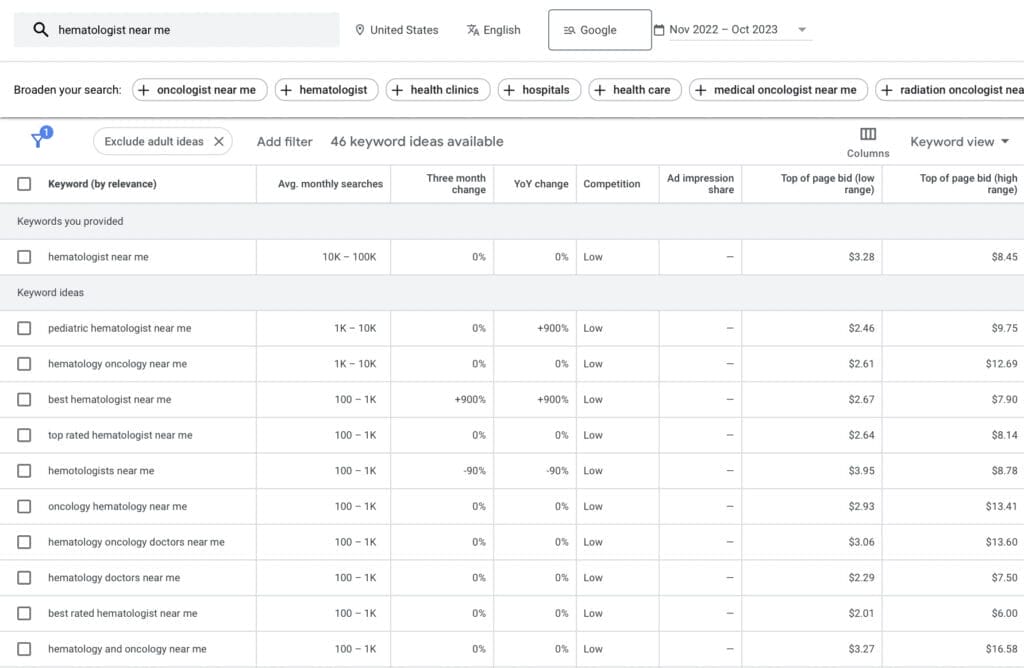
Keywords Everywhere is a browser extension that offers a “freemium” plan that does not require you to sign up or log in to any SEO tools online. This browser extension will also give you enough keyword data on volume searches, CPC (Cost per click), relevant keywords, and long-tail keywords.
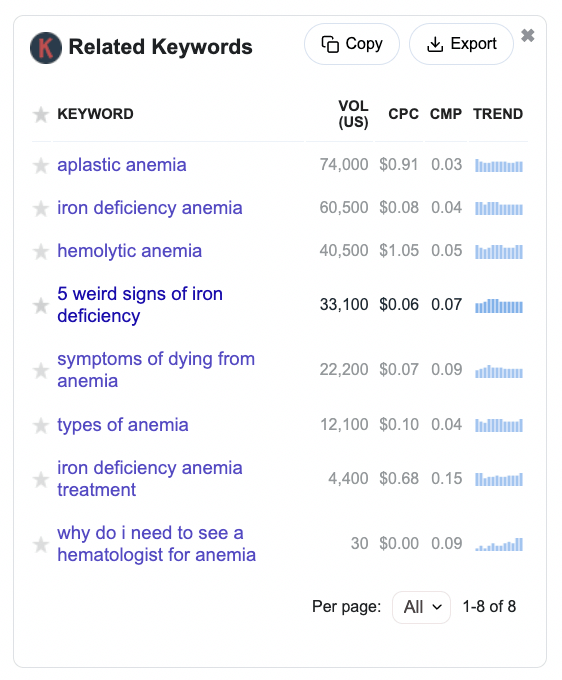

Another browser extension you can use is Whatsmyserp. It’s a free tool but you will need to create an account to access the keyword analytics, CPC, and a collection of related search terms that this browser extension offers. In addition, it also offers a free SERP checker tool.
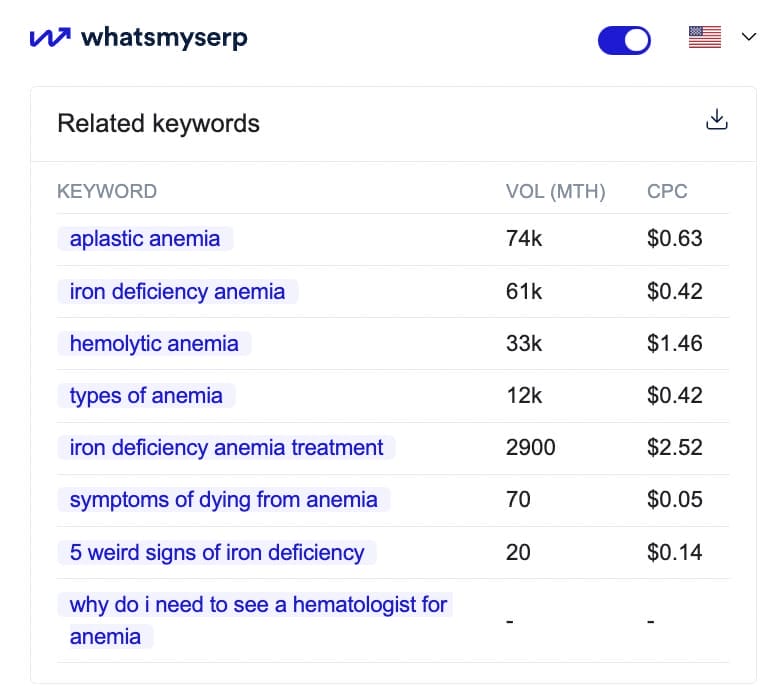
3.2 URL Slugs and Meta Descriptions
URL SLugs can be found as the last part of the URL address, like in the example below. It is a great place to include the target or primary keyword of a page, and it also serves as a unique identifier.
- https://www.thehematologyclinic.com/about-us/
This first example uses “about-us” as its URL slug. It gives the user a clear indication that the page will include information about the hematology clinic itself.
- https://www.thehematologyclinic.com/cancer-and-blood-disease/treatments/blood-transfusions/
This second URL example uses a much more detailed URL slug of “cancer-and-blood-disease/treatments/blood-transfusions” where you can also find the primary keyword. Using a longer and more detailed URL slug can help the user distinguish the type of content this page has. Using a more detailed URL slug is useful for medical practices like your hematology clinic, to describe a service or treatment you offer.
Optimize URL Slugs:
- Be descriptive
- Make it concise and easy to read
- Try to use less than 5 words
- Use hyphens and avoid underscores
- Use lowercase characters
- Avoid special or weird characters (e.g. emojis)
- Avoid using numbers that may need changing in the future, like the publishing date
Meta Descriptions are usually HTML tags. Their main purpose is to inform and interest a user to click on your page with a short description of what a page is about. You want your meta description to be concise, unique, and relevant to the page to encourage users to click on your hematology website.
The example below uses a short meta description and highlights that they are “internationally recognized hematologists”, offering quality care for potential new patients looking for their services.

Optimize meta descriptions:
- Include your primary target keyword
- Encourage the user to click on your page
- Keep your meta descriptions between 155 to 160 characters max
- Satisfy the user’s search query (Understand the search intent and provide a solution for their search query)
3.3 Title Tags and Alt Tags
Title Tag is an HTML code tag that gives your web page a title. The title tag can usually be seen in the browser and in search results. Make your title tags exciting yet helpful to read for the reader, and to support your keyword ranking efforts.
Here is an example of a title tag as seen in search results:

Here is an example of a title tag seen in the browser tab:

Optimize Title Tags:
- Accurately describe your page
- Keep the length between 50 to 60 characters
- Avoid keyword stuffing
- Target one primary keyword
- Make your title tags unique on your website and on the SERP
- Make sure the title element is present in your page’s HTML
Alt Tags describe the appearance of an image being used on a page of your hematology website. It also allows search engines to crawl and rank your website. Alt tags also work by helping screen reading tools to describe the images for visually impaired readers. Ensure your alt tags are accurate so that website crawlers and users can understand the content of your webpage.
Best practices for alt tags:
- Don’t copy the image caption
- Keep it short and descriptive
- It should be relevant to the topic discussed on the page
- Use up to 125 characters or less
- Avoid keyword stuffing
- Include primary keywords
- Don’t include “image of” or “picture of”
3.4 Internal and External Links
Internal links are hyperlinks on one page of your site that direct the reader to a target page on your site, whereas an external link is a hyperlink that directs the reader to a reputable page on a different website. While internal links should provide additional and relevant information, external links also help search engines have a better understanding of your page’s topic. In addition, it can boost the ranking and reputation of your allergy website when using authoritative and relevant sources.
Best Practices for Internal Links:
- Include at least 3 to 5 internal links per page.
- Avoid phrases like “click here” or “read here”. Replace these with anchor texts.
- Use plenty of internal links on your hematology website.
- Only link quality, relevant pages that have high authority, to improve your ranking and the user’s experience.
Best Practices for External Links:
- Link relevant sources.
- Use credible and professional sources.
- Don’t link your competitor’s website.
- Use keyword anchor texts.
- Make sure that your external links open to a new tab.
Update Old Blog Posts
If you have plenty of blog posts or articles on your hematology website, consider updating these to support your on-page SEO efforts. Doing so will help maximize your reach, and further help your site rank high on relevant searches. Updating old blog posts will also signal to search engines and users that your website and content are relevant and up-to-date.
How to update blog posts?
- Check for outdated features or trends that are not applicable in the present time. Remove these from your posts.
- Check all internal and external links on your blog posts. Make sure these don’t redirect users to dead links or broken links.
- Promote your blog post using other formats, for instance, infographics (This is useful for long-form content).
- Share your blog posts on social media platforms, like LinkedIn and Pinterest.
Do you want to implement SEO strategies to your website but simply don’t have time?
4. Off-Page SEO Strategies
Off-page SEO involves making efforts from the outside of your hematology website. Off-page SEO strategies involve building backlinks and making efforts to gain exposure through different channels and platforms.
4.1 Guest Posting
Guest Posting is one of the different ways you can gain exposure for your hematology website. It’s an effective tactic for link-building, which is the process of other websites linking pages from your hematology website. As a result, it can drive high-quality traffic to your site and improve your ranking on search engine results pages. Link building can also help you gain high-quality backlinks which signal to search engines that you’re an industry expert.
For guest posting opportunities, search “write for us+hematolgy”, and search results will provide you with websites that are currently accepting guest posts for your chosen industry, in this case for hematology or for blood diseases.
Best practices for writing guest posts:
- Follow guest post guidelines.
- You must meet the requirements and terms and conditions of the website.
- Follow with their style of writing.
- Include internal links from their website.
- Proofread for grammar and spelling mistakes.
- Work on your author’s bio. Mention things about yourself, your expertise, and even social channels where they can reach you.
4.2 Content Marketing
Content marketing is an off-page SEO strategy that can help you nurture and convert leads. With content marketing, you can also attract and retain your target audience so long as your content is enjoyable, and informative and also provides a solution for your target audience. Use different channels or platforms to share and distribute your content to support your off-page SEO efforts, such as the following examples:
- Ebooks
- Podcasts
- Newsletter
- Social Media
- Press Releases
- Email Marketing
- Video Marketing
- Influencer Marketing
- Content Syndication
- Online Forums
Content Marketing Funnel
When writing your content, you may want to consider the content marketing funnel, to help your hematology website convert new visitors into patients. The three stages of the content marketing funnel can also help you better understand your potential client’s journey before making a decision and taking action, such as booking an appointment.
- Awareness – This focuses on educating your target audience about a certain topic.
- Evaluation – This is when potential patients decide if they need your product or service.
- Conversion – This is when they consider the reasons why they need to buy your product or service.
4.3 Social Media Marketing
Social media platforms are a great channel to use to distribute your hematology content. This is because social media involves engaging with your target audience, and as a result, it can help increase organic clicks and establish authority. In addition, it can also improve your local ranking, drive on-site engagement, generate backlinks, and gain insights from your social media metrics.
Best practices for social media marketing:
- Identify your target goals.
- Plan your content per month and use a content calendar tool to stay organized and on track.
- Create visually engaging posts.
- Publish authentic and relevant content.
- Share customer feedback.
- Share on social media groups like Facebook and LinkedIn groups that are relevant to your niche or industry.
4.4 Online Forums
Joining online forums is another great strategy for off-page SEO. The reason you want to participate in online forums is because it can help you gain more backlinks, it can drive website traffic, build authority, and overall help you gain more new potential clients. Online forums can also help your hematology website have a stronger online presence and improve your ranking on SERP.
When taking part in online forums, establish your expertise in the hematology industry and link relevant sources from your hematology site to support your answers. Doing so can help you build credibility, a good reputation in online forums and earn the trust of others participating in these platforms. Consider the following factors when joining online forums like Reddit, Quora, LinkedIn, and Facebook groups:
- Provide accurate answers
- Follow the platform’s policies
- Support your answers with relevant links
- Don’t add links in every single answer you provide
- Don’t spam the comment section only to get more links (Spamming diminishes your credibility and can ruin your reputation)
5. Technical SEO Strategies
Technical SEO involves optimizing the technical aspects of your hematology website. Ensuring that the technical aspects of your SEO for hematologists campaign are running smoothly on search engines will ensure that your webpage will rank high on SERP.
5.1 Website Security
Website security is a technical SEO aspect that you must have to earn the trust of your potential new clients and to avoid risking personal information from your users being stolen by hackers. You can secure your hematology website by using HTTPS since it helps protect sensitive user information from being compromised, and by using a “secure encrypted connection”.
Best practices for website security:
- Work with a reliable hosting provider
- Schedule regular website backups
- Update your website to the latest version
- Use anti-malware software
- Use a web application firewall
- Install an SSL certificate to authenticate the identity of your site
5.2 Page Speed
Improve the page speed of your hematology website by compressing the images on the page, and minimizing the use of javascript files. You can also use a content distribution network or CDN for requested files to require less distance travel by using the nearest server, to improve the overall speed of your page.
5.3 Single Website Version
Avoid having more than one accessible version of your hematology website to avoid duplicate issues and negative effects on your SEO efforts.
The example below shows what two accessible versions can look like for a single webpage.
- https://thehematologyclinic.com/
- https://www.thehematologyclinic.com/
Multiple versions of your hematology website can negatively affect your ranking on search engines like Google, and it can reduce the effectiveness of your backlinking profile.
5.4 Mobile Friendly Website
The majority of users use mobile devices on an everyday basis, so you want to ensure that your hematology website is compatible with mobile devices since Google uses mobile-first indexing. This is done to index your site, to check how compatible your hematology website is on mobile devices, and to decide the rank of its content. To check if your website is mobile-friendly, you can use free tools like Mobile-Friendly Test on Google Search Console.
5.5 Keyword Cannibalization
Keyword cannibalization happens when too many identical or similar keywords are used throughout the content on your hematology website. When this happens, you are essentially competing with yourself and Google will have difficulty choosing which page should rank higher. As a result, it could potentially rank the page you didn’t mean to prioritize.
How to fix keyword cannibalization:
- Create a targeted keyword strategy
- Track keyword rankings and performance
- Do regular content audits
- Organize all the URLs and target keywords from your allergy website (e.g spreadsheets)
- Reduce the number of times the keyword is used or remove if it possible.
- Improve the content of your pages with better quality.
- Check if any pages cannibalize each other and why.
5.6 Fix Duplicate Contents
Find duplicate content on your hematology website so you can fix it and avoid backing dilution and wasted crawling spending. You want to avoid duplicate content because it will also make it hard for bots to decide which page should rank high, affecting your rank on SERP.
Use tools like Semrush to find and fix duplicate content on your hematology website. Using tools like Semrush can also provide you with real-time performance reports to identify your rank on search engines like Google, Yahoo, Bing, and YouTube.
5.7 Fix Broken Links
Apart from fixing duplicate content, you may also need to fix broken links. These can happen when a website visitor or user is unable to access a link on your webpage, which can happen due to a change in the URL, the removal of a page, or because you have forgotten to redirect the outdated URL to its new domain.
You will want to update or remove any broken links to avoid affecting the user experience on your hematology site, and because you don’t want to discourage users from performing an action of conversion. To fix broken links, you can use tools like Google Search Console or Ahrefs’ Broken Link Checker to find broken links on your hematology pages. Tools like these can also help you track the ranking and performance of your site on Google’s search results pages.
6. Conclusion
Investing in SEO for hematologists is essential if you want to stand out and succeed in today’s competitive digital landscape. A successful SEO campaign will help you establish a stronger online presence, and it will help you rank high on SERP so that potential new clients can easily find you. By carefully implementing on-page, off-page, and technical SEO strategies on your hematology website, you will help boost your visibility, credibility, and trust.
In this article, we discussed our insights from running over 1,000 successful SEO campaigns. Carefully implement the SEO strategies mentioned to help you have a successful SEO for hematologists campaign, and rank high on search engine results pages, which as a result will bring your hematology clinic more new clients!
For faster results, read how Google Ads for Hematologists can also help you. You can learn more about our successful SEO campaigns by visiting Yoyofumedia’s page.
For further assistance setting up and managing your SEO, feel free to schedule a free consult and experience your ROI growing exponentially once your campaign gains traction!







